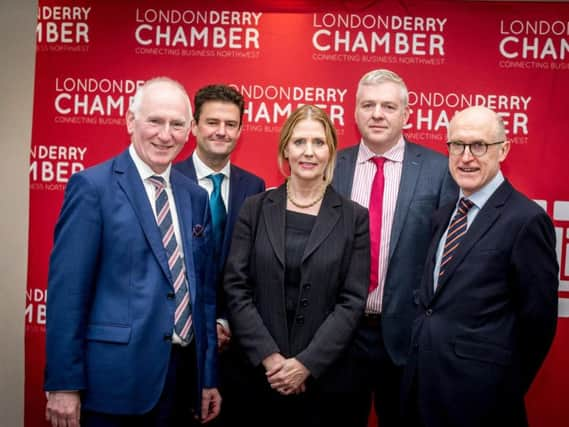Video: Jo Aston of SONI and Brian McGrath of Derry Chamber outline the urgent need for a green energy revolution


The call didn’t come at an environmentalists’ rally but at a Chamber of Commerce event where the System Operator for Northern Ireland (SONI) outlined its medium-term decarbonisation plans.
SONI runs the NIE-owned transmission network and recently launched its ‘Strategy 2020-25’. This is geared towards a rolling transition to almost exclusive green energy in the next three decades that will help meet local and international emissions targets.
Advertisement
Hide AdAdvertisement
Hide AdJo Aston, SONI’s new managing director joined the company earlier this year. She didn’t mince her words when outlining the challenges ahead at the event in the Waterfoot Hotel.
“I think it is a critical time for the energy industry. I think it’s a critical time for everybody in the room because we are going to go through quite radical change on both a personal level and on an organisational level,” she said.
Ms. Aston said ensuring the North’s grid can handle 95 per cent renewable energy is a key priority. This is a significant hike from the current figure of 65 per cent but will help us towards the 2050 zero net carbon emissions target.
The stakes could not be higher, as the former Utility Regulator executive explained.
Advertisement
Hide AdAdvertisement
Hide Ad“I suppose you have to ask: Are we heading for another mass extinction event, our own? That’s why I believe it’s critical that we do take action now.
"That’s why in terms of SONI’s strategy, that’s really our focus in making sure we have a green energy system ready for the energy transition that really needs to happen.”
President of the Chamber of Commerce Brian McGrath said policy-makers, business and society recognised the need for a green agenda.
“Perhaps climate change is the one thing that might trump our traditional politics in NI. A sort of planetary emergency might be the only thing that could do that. We generate a lot of renewables in the North West region. We’ve got a lot of wind energy. We’ve got offshore potential.
Advertisement
Hide AdAdvertisement
Hide Ad“The problem is that we’ve been largely deindustrialised over the last 50 years. The paradox of that is that it actually means we’ve got potential to do something.
“We need to convert potential with the renewable resources that we have so that we get regional consumption for energy instead of having to pipe it all down to metropolitan Belfast where they do what they do down there.
“So there is a lot of opportunity in this particular area to harness the energies that we’ve got,” he said.
Ms. Aston predicted far-reaching societal and economic change over the next 30 years.
Advertisement
Hide AdAdvertisement
Hide AdThe power system in Ireland needs to be rapidly transformed, she said.
“The word transform is about recognising that this isn’t an evolution. It’s really a revolution. This takes radical change and it’s radical change beyond the energy industry. It’s also at an individual level, as well as at a corporate level,” she prophesied.
One of the short-term aims is to make sure that 70 per cent of electricity generated in Ireland is renewable by 2030.
Scotland is targeting 100 per cent by that date and is already at 78 per cent now.
Advertisement
Hide AdAdvertisement
Hide Ad“We’ve achieved 40 per cent renewables on the system today, a year ahead of the target, and I think when that target was set we all thought: Is that really achievable? But we have achieved it.
“Perhaps that was the low-hanging fruit, that actually getting to 70 per cent is a lot more challenging and requires a lot more dramatic change than the 40 per cent did,” she said.
These, remember, were the words of a civil engineer who manages the electricity grid that powers every home, business, school, hospital, factory and farm in the North.